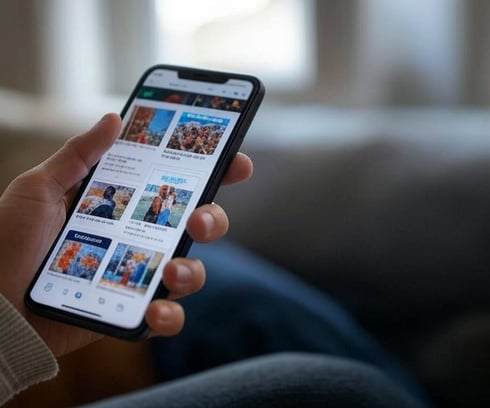The Impact of the Content We Consume Daily
Understand how the content we consume every day affects our mind and life, with tips to make better choices and take care of your mental health!


The Impact of the Content We Consume Daily
Have You Ever Stopped to Think About How Much Stuff We See and Hear Every Single Day?
I’m honestly blown away when I think about it! There are TikTok videos, Instagram posts, news on TV, messages on WhatsApp—it feels like it never ends! And you know what I started to notice? The impact of the content we consume daily is huge, and it affects us in ways we don’t always realize. It can make us laugh, teach us something cool, but it can also leave us feeling anxious or down without even knowing why. Today, I want to talk to you—as if we were just sipping juice on the porch—about what all this content does to our minds, and how we can be more mindful about what we choose to consume. Let’s have this chat?
Why Does the Content We Consume Every Day Affect Us So Much?
First, let me tell you why the stuff we take in every day has such a big impact. We’re living in a time that’s just crazy with information overload! I saw a 2023 Nielsen study that says people spend an average of 3 hours and 15 minutes a day on social media—and that’s not even counting time watching TV or browsing the web. Three hours, people! That’s a lot of time being bombarded with ideas, images, and opinions, while our brains try to keep up.
And it’s not just the amount of content that matters. What we consume changes how we feel and think. If I spend the day looking at bad news or scrolling through Instagram comparing myself to “perfect” lives, I feel awful. A 2022 report from the American Psychological Association showed that 60% of people who consume a lot of negative news feel more anxious. So yeah—what we let into our minds really matters!
How This Content Messes with Our Minds and Emotions
I’ve felt this myself, and I bet you have too. Let’s break down how this happens so we can better understand what’s going on.
It Can Make Us Anxious and Stressed
You know that feeling when you see a heavy news story—like about an accident—and you can’t stop thinking about it all day? Or when you scroll through Instagram and it seems like everyone’s living their best life while you’re just trying to survive? Yeah, that hits hard. I’ve been there. One day I saw so much bad news, I couldn’t even sleep right. A study from the University of Sussex in the UK showed that negative or comparison-driven content can raise stress levels by up to 20%. So it’s not just in your head—this stuff really does weigh on us!
It Messes with Our Focus and Our Day
Another thing I’ve noticed is how content can mess up our ability to focus. You ever sit down to work or study, then watch a funny video—and suddenly it’s two hours later and you’re still watching stuff? That’s me, all the time! A study from the University of California showed that after a distraction, it takes up to 23 minutes to refocus. So that “quick” video can really eat into your day. I’d end the day feeling unproductive and even more stressed.
It Changes Our Mood and Thoughts
What we consume also affects how we feel. If I spend the day watching cute dog videos or organizing tips, I feel energized and inspired. But if I watch sad or aggressive content—like those endless Twitter fights—I end up in a bad mood. An article from Harvard Business Review explains that content triggers emotions in our brains: good stuff makes us happy, and negative stuff can leave us irritated or down. So yeah, what you choose to watch can totally shape your whole day.
The Long-Term Impact on Our Lives
Beyond the day-to-day, what we consume can change our lives in the long run. That blows my mind—how much it can shape us, for better or worse.
It Can Shift What We Believe
The things we believe about the world? They’re shaped by what we see and hear. If you’re always watching content that puts down certain people or groups, you might start to believe that stuff without even realizing. I saw this happen with a friend of mine—he started following some really aggressive pages, and over time he became more intolerant. A 2021 Oxford University study showed that people who consume a lot of polarized political content tend to become more extreme in their views. It’s like the content plants little ideas in our minds, bit by bit.
It Affects Our Mental Health
Long term, content also affects our mental health. If I spend months consuming stuff that makes me anxious or insecure, it builds up—and can turn into a serious problem. The American Psychological Association says that constantly consuming negative content can raise the risk of chronic anxiety and depression. I’ve felt that—there was a time when I was addicted to negative news, and I started feeling super pessimistic. That’s when I realized something had to change.
How to Choose Better Content to Consume
Now that we understand how big the impact is, let me share what I’ve been doing to be more intentional with what I see and hear. These are simple tips that have helped me take control and protect my mental well-being—and I think they could help you too!
Look for Stuff That Makes You Feel Good
The first thing I did was be more selective. I unfollowed accounts that stressed me out or made me feel bad—like the ones full of comparisons or drama. Now, I only follow pages that uplift me, like recipe accounts, organization tips, or cute animal videos (I mean, who can resist a kitten, right?). When it comes to news, I stick to one or two reliable sources and check them just once a day. A study from the APA says that consuming content from positive, trustworthy sources helps reduce anxiety. And honestly, that shift has been amazing for me.
Set Time Limits for Social Media
Another lifesaver? Limiting how long I spend online. I realized that if I kept scrolling endlessly, I’d waste hours and feel worse afterward. So I started using a 30-minute daily timer—and I try to stick to it. That Sussex University study showed that cutting screen time can lower stress by up to 20%. I totally feel that—when I put my phone down, it’s like my brain can breathe!
Create a “Content Diet” That Works for You
I started thinking of content like food—not everything is good for you all the time. So I made a little “content diet” for myself. During the week, I focus on things that help me grow—like productivity podcasts or educational videos. On weekends, I allow myself light stuff, like my favorite series or funny clips to relax. Mental health expert Dr. John Grohol from PsychCentral says balancing the kind of content you consume helps keep your mind healthy. And honestly, it’s been a super fun way to take care of myself!
Tools That Help Me Filter What I See
On top of those habits, I found some tools that make it way easier to control what I consume. Let me share my favorites—the ones I use and that experts also recommend.
Apps to Avoid Overusing Your Phone
There are some great apps that help you stay off your phone. I use Screen Time on my phone, which warns me when I’m going over my social media limit. I also like Digital Wellbeing—it shows me how much time I spend on each app and helps me stay mindful. A Carnegie Mellon University study says screen time control tools help improve focus and reduce stress. These are working great for me!
Blockers to Avoid Harmful Content
If you want to avoid stuff that drags you down, try extensions like News Feed Eradicator for Facebook—it hides your feed and shows only the essentials. I also use BlockSite to block sites I know stress me out, like gossip pages or toxic forums. These tools help keep your mind on things that are actually good for you.
How This Can Change Your Life
Now imagine this: what if you could choose better content and feel lighter in your mind? I’ve felt this change in my life—and I know you can too. When we consume things that make us feel good, we feel more energized, more focused, and even happier. You’ll reduce anxiety, feel more motivated, and have a more peaceful view of the world.
Of course, you don’t have to change everything overnight. But just starting with one or two tips can already make a difference. It’s like swapping out a heavy meal for something lighter and more nourishing—over time, you just feel better!
You Can Choose What Makes You Feel Good
So, did you enjoy our chat? The impact of the content we consume every day is massive—it affects our minds, emotions, and even our future. But the good news is: we can choose what we take in. By seeking out positive, trustworthy content, limiting screen time, and using tools to filter the bad stuff, you can protect your mental health and feel lighter every day.
Why not start today? Pick one tip and try it for a day. Little by little, you’ll feel your mind clearer and your days more joyful. You deserve that peace—and I’m rooting for you to find your balance!
Key Takeaways from This Article
The content we consume daily affects our thoughts, emotions, and mental health.
Negative content increases anxiety and stress, as shown by studies.
It also impacts focus, productivity, and long-term beliefs.
Choose positive, reliable content that uplifts and inspires you.
Set time limits for social media and build a balanced “content diet.”
Use tools like Screen Time and BlockSite to manage what you see.
Mindful content consumption leads to more peace, focus, and happiness.
